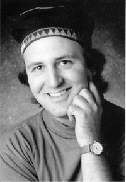READING A READING 18-20, by BEVERLY DAHLEN
A Reading 18–20 shows Beverly Dahlen as a deeper, more poetically adept, more comfortably playful with language, and more important poet than she has been to date . . . and I didn’t think that was possible. Since I first read A Reading 1–7, and went back to read The Egyptian Poems and Out of The Third, I have known that Dahlen’s poetry is work I love and that hers is one of the most significant bodies of work of our time, a knowledge also confirmed by A Reading 11-17. I was led to want to publish it, which I’ve done for Chax Press in A Reading 8–10 and A-Reading Spicer & 18 Sonnets.
But now I have in front of me the new book, which confirms and goes beyond what I already knew about Beverly Dahlen’s work. The poetry in this book floats, as consciousness, gathers and disperses, as air and water, and continues, as matter, or as shadow of matter. It is a very strange writing, yet one feels, at all points, as if the phrasing, the diction, and everything about it, is right. It simply has to be this way.
I read the book for the first time today, and I feel a little like I do when I come out of a great performance or movie, i.e. pretty speechless, simply stunned by the experience of the work. So I’m not going to say a lot, but I’ll try and say a little.
First, the beginning:
I could no more have done that than I could have flown. I was censored deleted hands on a marked battle, a revised version. why should his life have been saved, he was an old man presumably and fit to die. the others might have gone along with this medium priced heresy might have made light of it the standard justification. did you see any white shadows there?Here you can see and hear the amazing touch in language, moving from humor to serious questions, from battles to lives to heresy as lightly as possible, actually gliding through meaning. Like shadows, perhaps, and these shadows recur throughout the book. A shadow both exists and does not exist; it’s a tracing; in certain ways language is a human shadow, or perhaps in language humans are but shadows. Consider Shakespeare: “we are such stuff as dreams are made of” — Dahlen is acting/writing the being of “such stuff.”
our visionaries traipsed to the barn concocting a glorious revolution. I scared myself sitting down. one doesn’t necessarily wish to go in the predicated direction. did I owe him that?
not so much the
signification
that would
what’s matter drifting unsuch that we are at least
crowds probably, more than enough
crowds, probably more than enough
where signification is “not so much,” and we, as much as anything, are “matter drifting,” and where any meaning can be changed in a flash, by a deletion, a gap, or a change in the placement of a comma.
If a great part of the investigation or “reading” in the previous volumes of A Reading have been concerned with one and other, here there is not so much I and you, but much of the third person. The self is outside the self, although whether there is a barrier between outside and inside is entirely in question.
The identity of the third person: the father, who is either the father of lies or the author of “existence” — in any case, in whose sign we are constituted. To put the sign under eraser is a gesture, feeble in the circumstances, toward unmasking this father. It marks “his” absence. Any name may stand in this place. The log is absolute. One may conclude, as Watten does: “The world is everything that is not the case.”
Soon after, “the third person is the mother, whose presence is a kind of rumor.” And just a bit later, “The third person is the child, or rather the child-as-child-of-the-mother.” The distance is profound, and it is that distance in which we are engaged.
The shadow returns near the end as the shadow of “the material basis of reality the cornerstone of philosophy” which is now but “the triangular shadow that follows us.” Triangular as the father, the mother, and the child; triangular as the three-headed god; all of that and less, much less, shadow.
The book ends with a statement of our need for “belief in the coherence of systems.” That belief is bolstered by “verisimilitude,” which is a “problem in fiction” and is never noticed “unless it fails.” So fiction becomes us, “mourning becomes etcetera,” and we become immersed in a most glorious uncertainty, the world of A Reading 18–20.
I have not touched on the humor in this book, nor on the web of literary and philosophical reference. I leave that for each of you to find and revel in, as I hope you read this necessary book. I leave you with a passage, ending in a stop, from “A Reading 19.”
a slip of the tongue thought’s slippage a bald-faced lie
a slip of a girl tiny immaculate a foreign horn
burning her buttons tousled in thin air
foot-shot retriever ‘coarse materiality’
dragging a poem up by its roots shrieking
mama mama ‘the universal cry’ a voiced labial
sucking breathing and then a full stop
Published by Instance Press, 2006.
(Note: in the second indented quotation above, fourth line, there should be a large gap after the word "what's," that I have not yet figured out how to insert in blogger. Apparently within the blockquote tag, non-breaking spaces are not registered.)


1 Comments:
Thanks, Charles, for opening my eyes to the new Beverly Dahlen book, the "touch in language" "gliding through meaning."
Post a Comment
<< Home